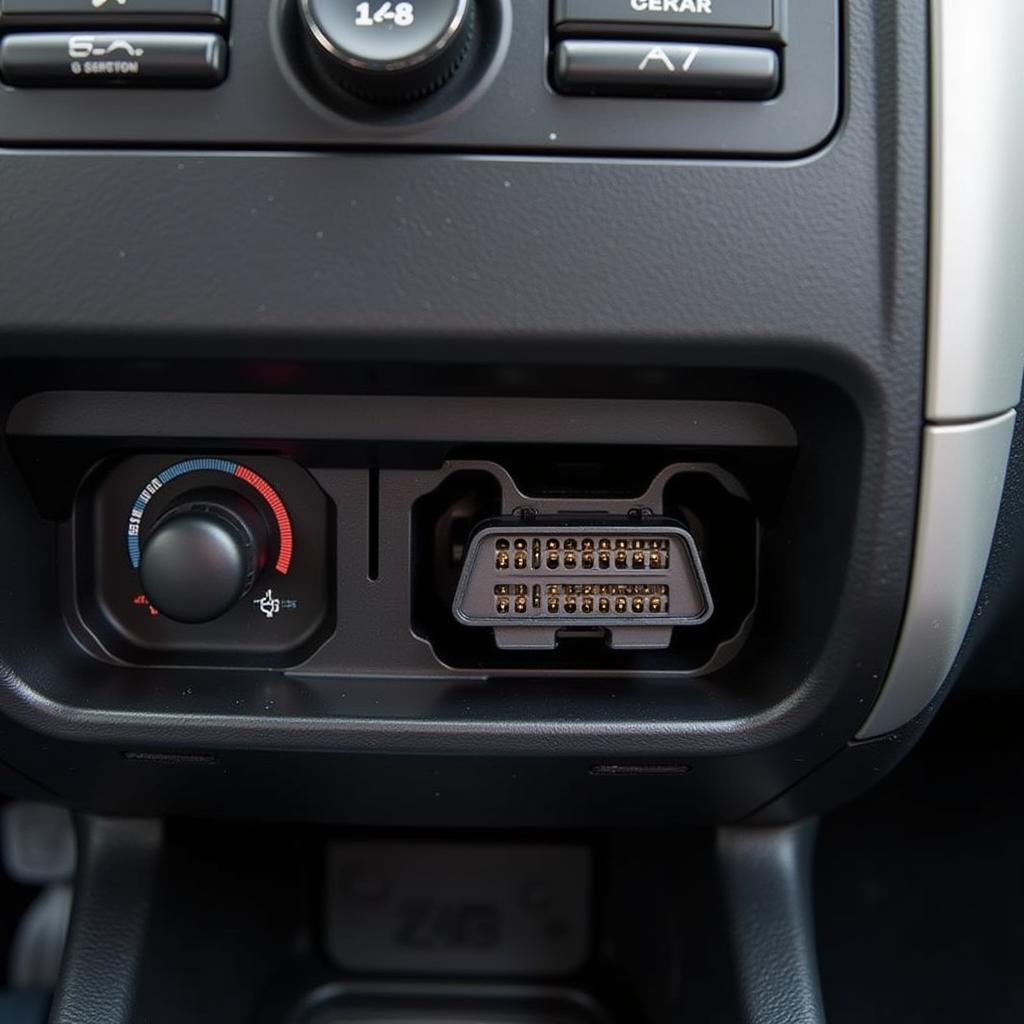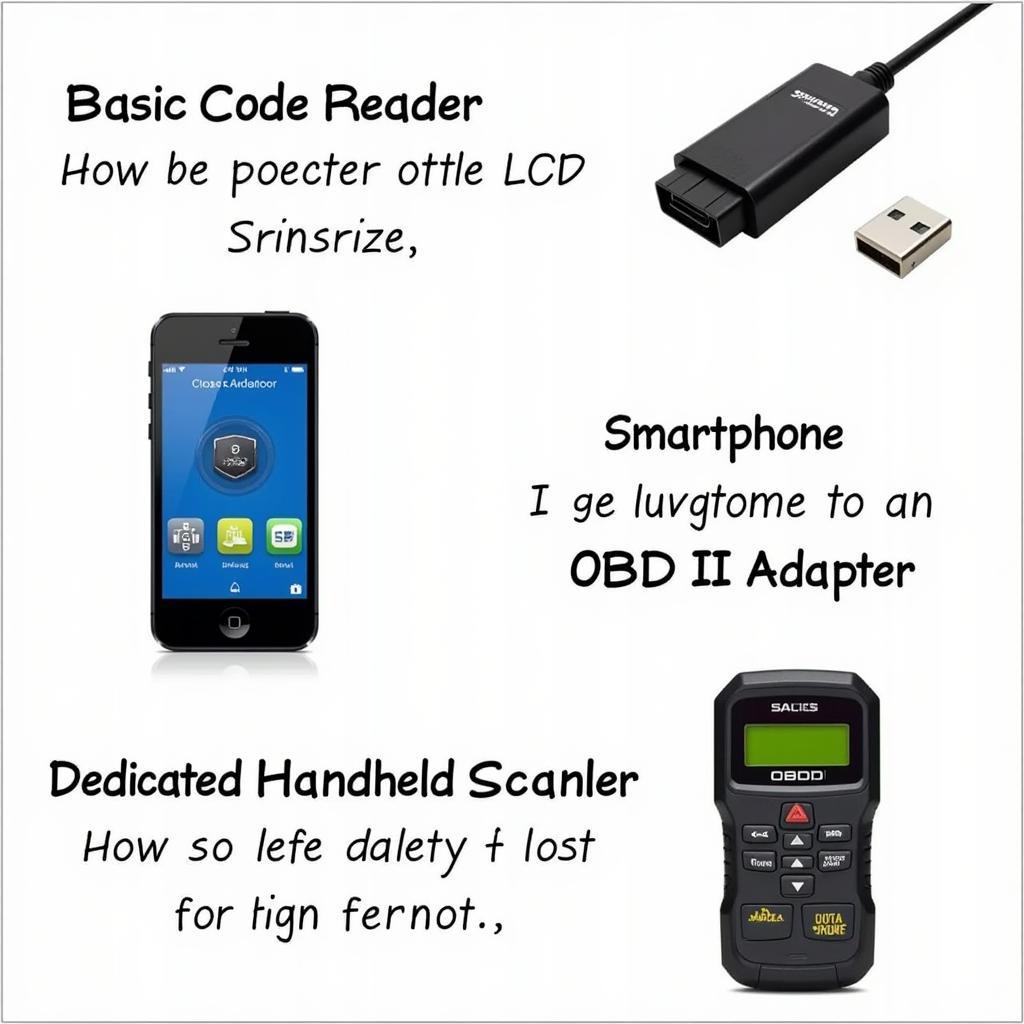Modern vehicles are increasingly reliant on complex electronics and computer systems. While this advancement offers convenience and enhanced performance, it also presents a challenge for car owners when issues arise. Understanding the source of a problem often requires specialized equipment and knowledge. Enter Home Diagnostics For Car. This approach empowers you to identify potential issues from the comfort of your own garage, saving you time and potentially expensive trips to the mechanic.
How Home Diagnostics for Car Work: A Basic Overview
Home car diagnostic tools connect to your car’s onboard computer system, typically through the OBD-II port (On-Board Diagnostics) found under the dashboard. This port acts as a communication gateway, allowing the diagnostic tool to retrieve Diagnostic Trouble Codes (DTCs), which are essentially error codes stored by the vehicle’s computer.
 OBD-II Port Location
OBD-II Port Location
Once connected, these handy devices can reveal a wealth of information about your car’s health:
- Read and clear DTCs: This is the most basic function, allowing you to understand the nature of the problem and potentially reset the warning lights on your dashboard.
- View live data streams: Observe real-time sensor readings like engine RPM, coolant temperature, oxygen sensor data, and more. This provides valuable insights into your car’s performance and can help pinpoint developing issues.
- Perform component tests: Some advanced tools allow you to activate specific components like fuel injectors or solenoids to test their functionality.
Choosing the Right Home Diagnostic Tool: Navigating Your Options
The market offers a wide array of car diagnostic tools, ranging from basic code readers to sophisticated professional-grade scanners. Choosing the best one depends on your budget, technical expertise, and desired functionality:
- Basic Code Readers: These entry-level devices are budget-friendly and mainly focus on reading and clearing DTCs. They’re suitable for casual users who want a quick understanding of basic car problems.
- Smartphone/Tablet-Based Scanners: These tools utilize apps on your smartphone or tablet, offering a user-friendly interface and additional features like data logging and graphing. They strike a good balance between affordability and functionality.
- Dedicated Handheld Scanners: These standalone devices offer more advanced features, including live data streaming, component testing, and access to manufacturer-specific codes. They’re ideal for DIY enthusiasts and home mechanics seeking greater depth in their diagnostics.
 Car Diagnostic Tool Comparison
Car Diagnostic Tool Comparison
Benefits of Home Diagnostics: Empowerment at Your Fingertips
Embracing home diagnostics for your car offers numerous advantages:
- Early Problem Detection: Regular checks can help you identify potential issues before they escalate into major repairs, saving you money and headaches in the long run.
- Informed Repair Decisions: Understanding the problem beforehand enables you to communicate more effectively with mechanics and make informed decisions about repairs.
- Cost Savings: By diagnosing problems yourself, you can avoid unnecessary trips to the mechanic for minor issues.
- Increased Knowledge: Familiarizing yourself with your car’s inner workings can be empowering and provide peace of mind on the road.
“Having a car diagnostic tool at home is like having an x-ray vision for your car,” says John Smith, a seasoned mechanic with over 20 years of experience. “It gives car owners the ability to see what’s going on under the hood and make informed decisions about their vehicle’s maintenance.”
Limitations of Home Diagnostics: Understanding the Boundaries
While home diagnostics are valuable, it’s crucial to acknowledge their limitations:
- Code Interpretation: While DTCs provide a starting point, accurately interpreting them often requires further research and understanding of car systems.
- Complexity of Modern Vehicles: Modern cars are intricate, and certain issues require specialized equipment and expertise beyond home diagnostics.
- Potential for Misdiagnosis: Incorrectly interpreting codes or data can lead to unnecessary repairs or even exacerbate existing problems.
“It’s important to remember that home diagnostics are a tool, not a magic wand,” cautions Smith. “While they can be incredibly helpful, it’s crucial to approach them with a healthy dose of caution and seek professional help when needed.”
Conclusion: Taking Control of Your Car’s Health
Home diagnostics for car empower car owners with valuable insights into their vehicle’s health. By understanding the basics, choosing the right tool, and acknowledging both the benefits and limitations, you can confidently take charge of your car’s maintenance and potentially save yourself time and money.
Remember, while home diagnostics are a powerful tool for early problem detection, it’s crucial to consult with a qualified mechanic for complex issues or if you’re unsure about interpreting diagnostic results.
Frequently Asked Questions
1. Can I use any diagnostic tool on my car?
Not all diagnostic tools are compatible with all car models. It’s important to choose a tool that supports your car’s make, model, and year. Refer to the tool’s documentation or manufacturer’s website for compatibility information.
2. Are home diagnostics for car difficult to use?
Most home car diagnostic tools are designed with user-friendliness in mind. Basic code readers are very straightforward, while more advanced scanners might require some technical knowledge.
3. Can I fix any problem identified through home diagnostics?
Home diagnostics can help you identify potential issues, but they don’t provide a fix. Some problems might be simple DIY fixes, while others require professional attention.
4. What should I do after reading a DTC with my home diagnostic tool?
Research the specific code online or in a car repair manual to understand the potential causes. This will help you determine the next steps, whether it’s further investigation, a simple fix, or a visit to the mechanic.
5. How often should I use home diagnostics for car?
It’s a good practice to perform a diagnostic scan every few months or if you notice any unusual behavior from your car. Regular checks can help catch problems early on.
Need help with your car diagnostics? Contact us via WhatsApp: +1(641)206-8880 or Email: [email protected]. Our 24/7 customer support team is here to assist you.
Looking for car electrical diagnostic tools? We have a wide selection available!
For more information about car electrical diagnostics tools, check out our comprehensive guide.

Leave a Reply